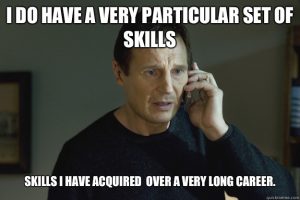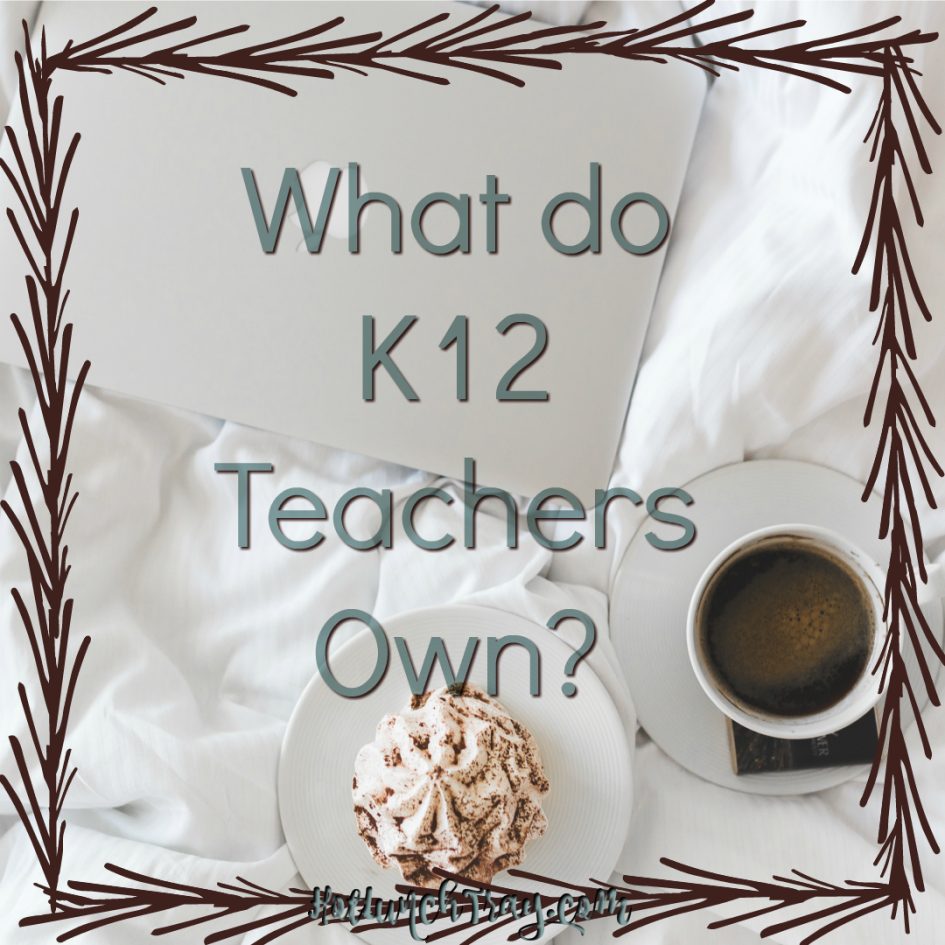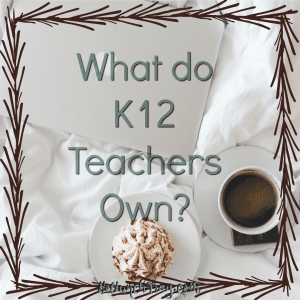Does it Matter what Teachers Own?
Teachers in public K12 classrooms have some very basic similarities. We create, carry out, and then redo our lesson plans. We use the common arrow in our plan book to indicate the extra effort on the part of all in the classroom to internalize the material that much more. And then we repeat. We were trained to sustain this continual churn in our teacher preparation classes, because this is what teachers have always done.
Right up until the Internet was added in to our cycle. Now teachers add into the mix the exchange between their lesson plans and the Internet. If a teacher is willing to search, there is content to enrich classrooms and lessons. But what if instead of spending time searching for content a teacher prefers to buy the content at a well-known website instead?
Now, it matters what teachers own. Because now there is profit to be made.
What is the Debate?
 Employers hire a teacher for a set of skills. They can extrapolate skills from your resume and your references. Employers do not necessarily hire you for the products you may create, but they have a reasonable certainty of the type(s) of content you can create when they hire you. And many employers expect those work products are theirs.
Employers hire a teacher for a set of skills. They can extrapolate skills from your resume and your references. Employers do not necessarily hire you for the products you may create, but they have a reasonable certainty of the type(s) of content you can create when they hire you. And many employers expect those work products are theirs.
As an educator you own those skills. You paid for your education, you worked in different educational settings. You honed your craft. But if employers provide you the means and you create something in furtherance of a work task, the product is strictly a work product.
Or is it?
Using an employers hardware, software, or time make it a work product. However, it is reasonable to argue if you use your skills outside an employer’s time, on your own hardware and software that product is yours. It becomes even easier to defend as your sole property if you do not use it within your classroom. You could say teachers do not own the products you create for classroom use, but the skills to reproduce a similar product with similar tools.
How to Keep it Legit
Respect the time and resources your district provides and use them as the district intends. Your district likely intends you to create lesson plans for your classroom demographic, using their scope and sequence, their available resources. Your district expects you to complete this task with the resources with which they provide.
In order for you to create something outside of the claim of the district, you would have to create it: outside school time, on your own computer, and with software and/or accounts which do NOT belong to the school. To better your case for your-product-not-theirs: the content could be outside your regular student-audience, outside the curriculum which you are currently teaching, and words and graphics should NOT be used from your daily teaching tasks.
The (NEA) has a suggested stance on lesson plans, but instead of being litigious consider some intentional planning to avoid the question altogether
While online content created may confuse the issue, consider always creating a sharing from a personal (Google)drive to school to create a path of ownership. Seek out parallel, free versions of what you have become familiar with through the classroom and use those to produce anything you attempt to sell. (free, smaller versions yet have same file types)
NEA education states: “…employees should own the copyright to materials that they create in the course of their employment. There should be an appropriate “teacher’s exception” to the “works made for hire” doctrine, pursuant to which works created by education employees in the course of their employment are owned by the employee. This exception should reflect the unique practices and traditions of academia.statement.” But short of hiring a lawyer to enforce the modest amounts you may make selling your creations, why not just work to avoid any misunderstandings?







2018-02-13 at 7:04 am
I think if the teacher creates it, they should be able to do what ever they want with it. And maybe if they weren’t so underpaid, they wouldn’t have to resort to selling their plans.
2018-02-13 at 5:29 pm
THIS. Robin, you are so on point. As a former teacher, I worked tirelessly to educate my students any way I knew how. And if I created something that inspired them, I was happy to share it with other educators looking for ways to help their students.
2018-02-13 at 7:29 am
I fully agree
2018-02-13 at 8:10 am
Interesting. I don’t know much about this. But if someone makes something, they should have the rights to it! Teachers especially! They deserve only the best.
2018-02-13 at 8:55 am
I had no idea this was happening, to be honest. Shouldn’t the teacher have the right to do whatever he or she wants with the lesson plan or content that he or she created? It’s their time and effort after all.
2018-02-13 at 11:52 am
If you created it…it’s yours. I imagine this is an issue for educators in our local school district as many of the kids participate in Google Classroom. I can also see the contradiction in profiting off something that was created using school resources though. This is interesting. I wonder where my kids’ educators stand on the issue and where our local school board and PTA stand on the matter.
Tomi C recently posted…HEY ARNOLD! THE JUNGLE MOVIE Available on Nickelodeon DVD
2018-02-13 at 11:54 am
I never realized this was such a concern! I think that if teachers created something themselves, they should be able to do whatever they want with it!
Lisa Favre recently posted…Super Easy, Super Creamy, Super Tasty Chia Seed Pudding
2018-02-13 at 1:25 pm
I use to teach and with anything I created I would sell it for others teacher to use. If you make it you have the rights to it, not the county.
2018-02-13 at 3:21 pm
I agree with Robin. Teachers are so underpaid, why not let teachers sell their plans? Sure its probably best to do that stuff at home, but from my understanding, teachers grade homework at home and do a lot of the prep work at home anyway and buy school supplies out of their own pockets.
2018-02-13 at 3:44 pm
I was discussing this with a teacher friend whose been told the items she created are school property which is silly but the current situation
Anosa recently posted…Slow Holidays with Inntravel
2018-02-13 at 4:00 pm
I have to admit this is something I don’t really know much about at all, I had no idea teacher sold things they create, definitely an interesting debate.
Sarah Bailey recently posted…5 Ways to Get People to Interact More with Your Blog
2018-02-13 at 5:33 pm
I only know what my son who is a special needs teacher tells me. He lives in a different state. Going to show him this see what he has to say.
candy recently posted…Orange Fluff Side Dish
2018-02-13 at 6:19 pm
I had no idea this was even an issue. I help out a lot during the week and my children s school and the teachers are all amazing! What they do for our kids daily is something to be celebrated.
2018-02-13 at 9:05 pm
I worked at an elementary school for years, before pulling my own child out to homeschool. I was a teachers aide, and I know that some of those teachers I worked with, they worked hard to create unique plans, and the fact that this is an issue is crazy! They create it, it’s their’s to do with as they wish!
2018-02-13 at 10:06 pm
It’s good that they can earn some with the content they create. I guess each teacher has his or her unique skills and approach.
Franc Ramon recently posted…Take the 28 Day Fitstrong Challenge with Mark Streigl
2018-02-14 at 1:52 am
I have always felt so bad for teachers and what they get paid. They work so hard and are literally shaping our future in this world and are given little in return. I think if it’s their creation, it’s their creation to do what they want with it.
2018-02-14 at 10:36 am
Growing up I wanted to be a teacher, but after work experience in the nursery, primary and secondary sector I realized how underappreciated teachers are. They are underpaid, not rewarded well for their time and most of all the workload is absolutely insane! And like yous said now with the added pressure of the internet they now have to do content plans and use technology to capture the audiences attention. When I was on my education university course I had to teach a lesson and it was so intense!
2018-02-14 at 1:27 pm
What a great article. Thanks for sharing and letting us know. Teachers deserve better.
2018-02-14 at 11:28 pm
I also think teachers should have the rights to what they create. They don’t make much money and this could help them earn extra income for their talents.
2018-02-15 at 6:58 pm
I feel like to some degree people like to debate everything. Generally, if you create something you own the right to it. I usually operate with that way of thinking.